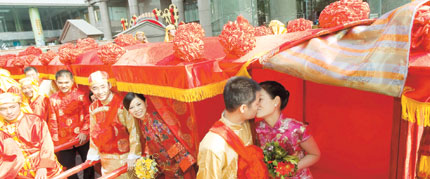|
|


ADVERTISEMENT
Buy Your own advertising
spaces!
.
Download Adobe Acrobat Reader to open [PDF] files.
Recent Visitors
Golden Tiger Year All is well, despite Net 'widow' chatter
2010. 10 January
 Young couples hold a traditional wedding in Shanghai. Although the coming lunar new year is considered a "widow year," it hasn't affected wedding plans in Shanghai and prices have increased by 5 to 10 percent because of high demand.
Young couples hold a traditional wedding in Shanghai. Although the coming lunar new year is considered a "widow year," it hasn't affected wedding plans in Shanghai and prices have increased by 5 to 10 percent because of high demand.
by Yao Minji
(shanghaidaily.com)
THE forthcoming lunar "Golden Year of the Tiger" is supposed to bring fortune and good luck, especially since the powerful tiger is linked with the element gold.
However, recent talk swirling on the Internet has captured attention and cast a bit of a shadow on the golden beast.
The uninformed chatter by many young people is that the next Chinese lunar year is a so-called "widow year" in which bad luck and infertility for life are said to befall those who marry in the year.
They're curious about the weird notion and many wonder if there's a way to avoid bad luck if they marry in the Tiger Year.
There was similar talk in 2005, the Year of the Rooster, and 2008, the Year of the Rat, but it isn't related to the animals of the zodiac, but rather to more complicated solar terms (we elaborate later).
The notion of a "widow year" stems from the difference between lunar and solar calendars, and it's all about the importance of fertility and child-bearing.
The vast majority of people today don't believe in "widow years" and a survey of marriage planners shows that they expect more marriages in 2010, not less, partly because it's the year of a great event for China - World Expo 2010.
Still, this astrology riff sheds light on Chinese culture and folklore.
Here's a bit of common mythology, In choosing a wife, it is said that men should avoid women born in Tiger Years, especially born at night (3-5am), when tigers are especially fierce and hungry. These women are said to be domineering, Also tigers and dragons should not marry because they are natural antagonists. Of course, tigers should not marry sheep/goats.
In ancient Chinese tales, the tiger was once a guardian of the Jade Emperor and was sent to kill monsters in the human world. The Year of the Tiger is often considered to be a bright and lucky year. In old sayings about prosperity, the tiger is frequently linked with the dragon, another auspicious beast. "Flying dragon and leaping tiger" was a common saying.
But the notion of a "widow year" is not related to the tiger. It originates in the Chinese lunar calendar based on moon phases, which do not accurately reflect seasonal and weather changes important to agrarian culture.
So drafters of the lunar calendar added 24 seasonal markers, 15-day solar terms based on the solar year, to indicate these changes in nature's rhythm to farmers and help them decide when to plant crops or harvest them.
The seasonal markers covering the year are called jie qi (jie means period and qi means weather).
In ancient times, the solar terms were the only indicator of seasons and weather, and played a vital role in agrarian life. Many traditions originated in solar terms.
For example, the Qingming Festival, or tomb-sweeping day, marks one of the 24 jie qi. Qingming means clear and bright and indicates nice warm weather. It usually falls around on April 4-6 of the solar calendar.
The notion of a "widow year" comes from the terms.
The solar terms start with Lichun, or the Start of the Spring, usually on February 4-6 of the solar calendar. Li means start and chun means spring. In traditional terms, the day of Lichun indicates that the yang (hot) energy rises rapidly in the universe as it enters spring - it also represents procreation.
The coming Year of the Tiger starts late on February 14 and ends on February 2 in 2011, which means there is no Lichun in the whole year.
Since there is no start of spring in the entire year, there is no rising yang energy (hot yang for male and cold yin for female) and no procreation, it is said.


